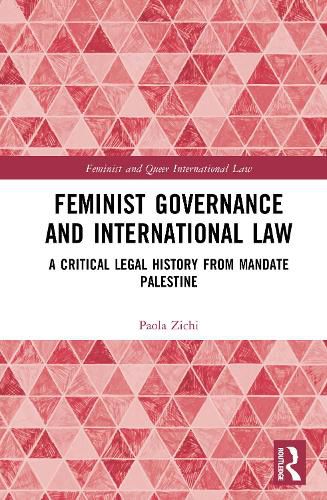Readings Newsletter
Become a Readings Member to make your shopping experience even easier.
Sign in or sign up for free!
You’re not far away from qualifying for FREE standard shipping within Australia
You’ve qualified for FREE standard shipping within Australia
The cart is loading…






Documenting the intertwined history of international institutions and transnational feminism through the lens of Mandate Palestine in the inter-war period, this book elicits the historical formation of a prototypical form of feminist governance at the international level. It is commonly accepted that 'International Women's Rights' entered the halls of international institutions with the 1979 passage of the Convention on the Elimination of Discrimination Against Women. But as this book argues, feminist interventions in international law began much earlier. Engaging the history of feminist engagements with the first international institution of modern international law, the League of Nations, this book - based on archival research and drawing upon TWAIL and critical legal feminist approaches - focuses on the Arab-Palestinian feminist movement. Uncovering a peripheral feminist legal agenda, driven by women under colonial rule, the book interrogates feminist legal advances in three different fields: criminal and anti-trafficking laws, family and divorce laws, and human rights and prisoners' laws. Detailing this subaltern feminist legal activism, the book demonstrates how today's feminists' mission, as enshrined in the UN Charters, are the by-product of a much longer history of colonial resistance and contestation.
This book will be of considerable interest to scholars and researchers in the fields of international law, international history, women's and feminist history, and feminist legal studies.
$9.00 standard shipping within Australia
FREE standard shipping within Australia for orders over $100.00
Express & International shipping calculated at checkout
Documenting the intertwined history of international institutions and transnational feminism through the lens of Mandate Palestine in the inter-war period, this book elicits the historical formation of a prototypical form of feminist governance at the international level. It is commonly accepted that 'International Women's Rights' entered the halls of international institutions with the 1979 passage of the Convention on the Elimination of Discrimination Against Women. But as this book argues, feminist interventions in international law began much earlier. Engaging the history of feminist engagements with the first international institution of modern international law, the League of Nations, this book - based on archival research and drawing upon TWAIL and critical legal feminist approaches - focuses on the Arab-Palestinian feminist movement. Uncovering a peripheral feminist legal agenda, driven by women under colonial rule, the book interrogates feminist legal advances in three different fields: criminal and anti-trafficking laws, family and divorce laws, and human rights and prisoners' laws. Detailing this subaltern feminist legal activism, the book demonstrates how today's feminists' mission, as enshrined in the UN Charters, are the by-product of a much longer history of colonial resistance and contestation.
This book will be of considerable interest to scholars and researchers in the fields of international law, international history, women's and feminist history, and feminist legal studies.